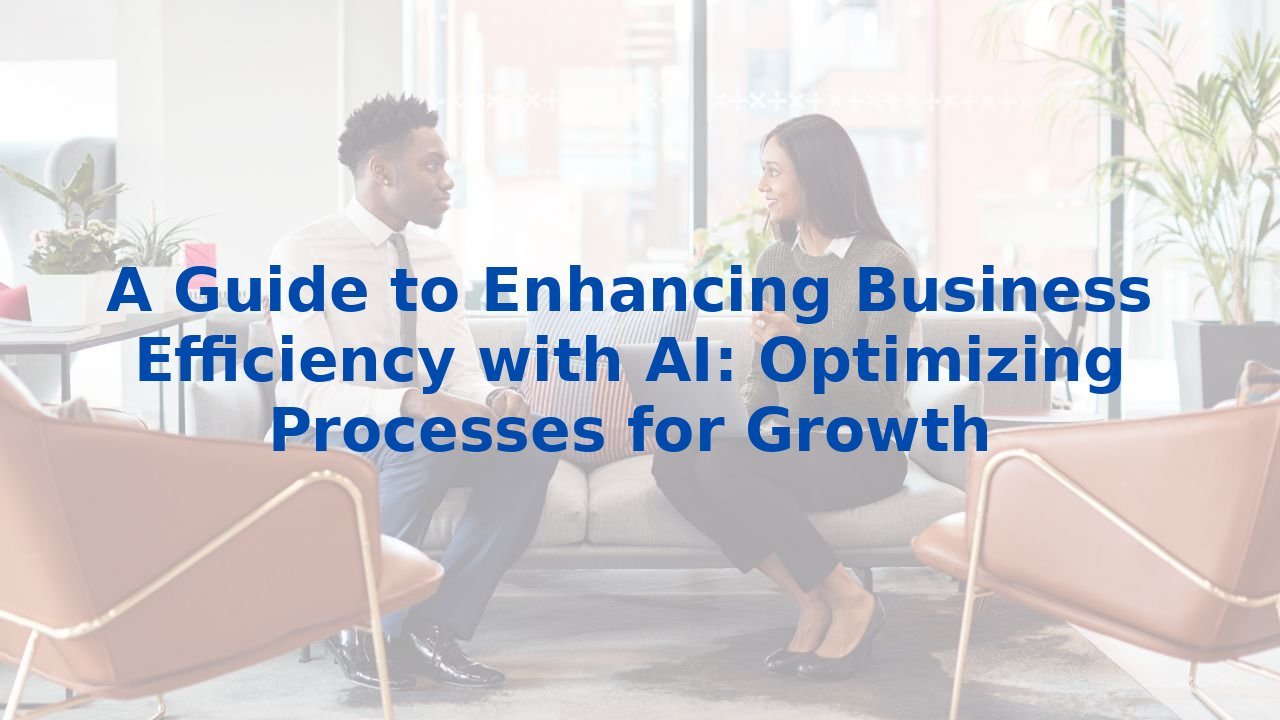A Guide to Enhancing Business Efficiency with AI: Optimizing Processes for Growth
A Guide to Enhancing Business Efficiency with AI: Optimizing Processes for Growth
In an era where business landscapes evolve at breakneck speed, efficiency has become not just a goal but a necessity. Organizations that fall behind in optimizing their processes may find themselves missing out on critical opportunities. Enter Artificial Intelligence (AI)—a game-changer that holds the key to enhancing operational efficiency by automating tasks, elevating decision-making capabilities, and streamlining business operations. This guide will explore how AI can transform various business processes while highlighting the importance of equipping your workforce with the necessary skills.
Understanding AI Process Optimization
AI process optimization leverages the power of AI and machine learning technologies to refine Business Process Management (BPM). At its core, this involves analyzing data to automate repetitive tasks and empower team members to make informed decisions. The ultimate objective? To drive down errors, boost productivity, and elevate operational efficiency.
Key Areas Where AI Enhances Business Processes
1. Automating Routine Tasks
In a world inundated with mundane tasks, AI can bring relief through automation. Consider document processing—AI excels in handling documents with speed and accuracy, dramatically cutting down on manual data entry. Through intelligent document processing, organizations can seamlessly convert raw data into actionable insights without human intervention.
Moreover, AI-driven chatbots take customer service to the next level by managing basic inquiries. This allows human representatives to concentrate on complex issues. Additionally, AI algorithms can sift through customer feedback, revealing crucial insights for improvement that may otherwise go unnoticed.
2. Improving Decision-Making
AI's capability to generate predictive analytics is a boon for decision-makers. By identifying patterns within datasets, AI can simulate various scenarios to understand the implications of different strategies like pricing adjustments—without the inherent risks of real-world trial and error.
Furthermore, integrative risk management through AI offers an avenue to pinpoint irregularities in data. This means companies can evade pitfalls and make smarter decisions that contribute to their bottom line.
3. Enhancing Sales and Marketing
Sales teams equipped with AI insights can focus their efforts efficiently. AI analytics dig into customer relationship management (CRM) solutions to forecast which customers present the highest revenue potential and those that may leave. With this information, teams can allocate their resources to nurture high-value contacts.
On the marketing front, AI excels in crafting personalized experiences. By analyzing customer behavior, AI can tailor marketing campaigns for enhanced engagement and conversion rates, ultimately leading to higher profitability.
4. Improving Product Development Processes
Generative design powered by AI transforms the creative process in product development. Instead of laboring over prototypes that might not meet necessary specifications, AI generates diverse design options based on set parameters. This practice minimizes waste of time and resources.
Additionally, implementing AI in quality control allows companies to scrutinize data from multiple sources to detect patterns that assist in enhancing product quality and reducing defects.
5. Automating Content Generation
Staying ahead in content creation is crucial for maintaining relevance in the market. AI tools are not only efficient; they produce engaging and informative text that ranges from product descriptions to insightful industry articles. This capability ensures businesses can rapidly generate high-quality content, maintaining their competitiveness.
The Role of AI in Business Process Management
AI doesn't just optimize; it fundamentally enhances Business Process Management in varied ways:
1. Process Discovery
Utilizing advanced techniques like process mining and natural language processing, AI unveils existing processes and highlights inefficiencies. This hands organizations a clear picture of their workflows, laying the groundwork for meaningful improvements.
2. Process Mapping
AI’s ability to visualize workflows through data analytics means organizations can produce comprehensive process maps, revealing inefficiencies and bottlenecks. These maps help maintain up-to-date documentation, a critical component of continuous improvement.
3. Process Automation
Robotic Process Automation (RPA), enhanced by AI, automates routine tasks, freeing employees to focus on strategic activities. This not only boosts efficiency but also reduces the likelihood of human error.
4. Process Improvement
AI enables data-driven insights and dynamic adaptability to instigate sustainable improvements. This capability empowers companies to make well-informed decisions and innovate continually.
The Importance of Training Employees for AI
The transformative potential of AI hinges on an organization's most vital asset: its people. Training employees to work effectively with AI tools can unlock myriad advantages:
Enhanced Productivity
Employees equipped with AI knowledge can harness automation, slashing the time spent on repetitive tasks and significantly elevating overall productivity.
Improved Decision-Making
With AI training, employees are empowered to analyze data more effectively, leading to sounder decision-making that fosters business growth.
Adaptability
As AI technologies evolve, a well-trained workforce can seamlessly adapt, ensuring the organization remains at the forefront of advancement.
Reduced Errors
Proper training allows employees to use AI tools geared toward minimizing errors, translating to a more accurate execution of processes.
Conclusion
AI is not merely a buzzword; it is a robust ally in enhancing business efficiency. By automating tasks and refining decision-making, AI streamlines operations and paves the way for growth. Understanding how AI can enhance key processes, coupled with effective employee training, is a recipe for long-term success. Embrace this transformation and leverage the full power of AI to optimize your business processes today.



